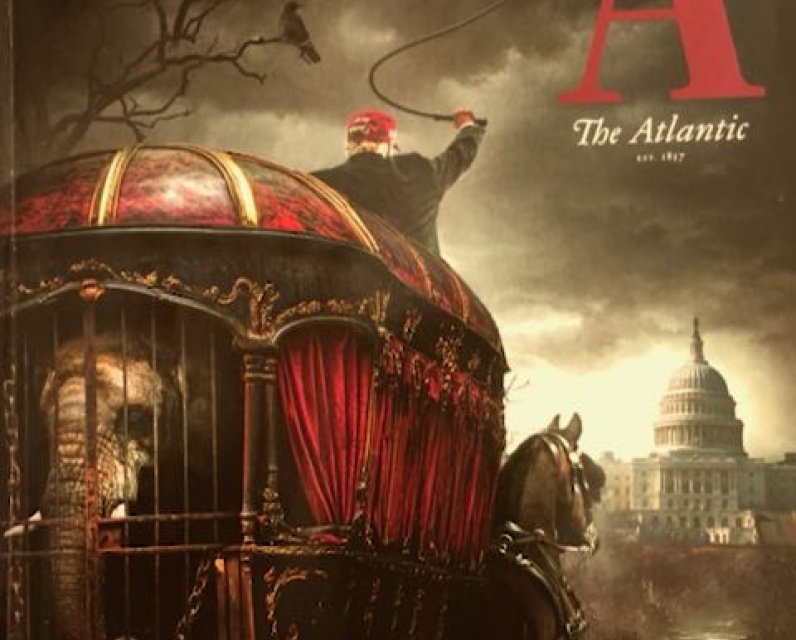Unpublished Opinions
Guy Talevi was 2022 Fundraising Chair for the Green Party of Ontario in Ottawa Centre. He lives in Ottawa.
A Farewell to American Democracy

In his 1992 book “The End of History and the Last Man”, Francis Fukuyama argued that liberal democracies have become humanity’s final form of governance. I guess the joke was on us.
America, Then and Now
America’s Founders were inspired by the set of ideals we now call liberal democracy: the rule of law, separation of powers, liberty, equality and constitutionally protected rights of the individual. Over time, its form and customs have been shaped by presidents confronting crises:
- the corruption and material excess of the Gilded Age was tempered by President Theodore Roosevelt’s use of the Sherman Antitrust Act to break up corporate monopolies
- the Great Depression spurred FDR’s administration to intervene in the economy, create jobs and provide economic relief for citizens
- the 1960’s civil rights movement motivated the Johnson administrations’ Civil Rights Act and Voting Rights Act
The economist Thomas Piketty, in his 2014 work “Capital in the Twenty-First Century”, found that ”the gradual privatization and transfer of public wealth into private hands (in Europe and America) in the 1970s and 1980s”, and the long-term increase in real estate and stock market prices in the 1980s and 1990s, drove private wealth and gave rise to what he called “patrimonial capitalism”. Piketty makes the case that the concentration of wealth in the hands of the few is no accident, but a feature of capitalism.
The countervailing checks and balances on big money - labour unions, citizen’s groups, the media, the Democratic Party and Congress - have been unequal to the task of democratizing wealth and power in America. While facilitating economic growth, democracy is being devoured by the very capital that grows from its success.
The 2011 Occupy movement opposed social and economic inequality and the role of big corporations and the global financial system. But it focussed on the top one percent of income earners, not wealth, at a time before Piketty’s book exposed the extent of inequality in private wealth. It is this stunning wealth of America’s richest political actors, given opportunity by the Citizens United decision, that has culminated most recently in what can be called, without exaggeration, American oligarchy.
Europe over the last two decades has been destabilized by populism and a general shift to the political right, driven by private wealth and the movement into Europe of migrant populations fleeing civil disturbance and drought. In particular, Hungary, Turkiye and Russia provide insights into what may await America under a Trump presidency.
Democratic Backsliding in Hungary
Once described as a defender of Hungarian democracy, President Victor Orban is now generally considered the chief architect of its demise and Vladimir Putin’s closest ally in the EU. His Fidesz Party has taken control of Hungary’s media and used it to promote a narrative linking illegal immigrants with terrorism. Orban then began his policy of “keeping Europe for Europeans, Hungary for Hungarians”. According to the European Parliament, Hungary has become illiberal, backsliding on the rule of law, corruption and LGBT rights.
Populism in Turkiye
Turkiye is perhaps Europe’s poster child for populism. For twenty years now, it has seen political repression, a foiled coup d’état, massive purges to the civil service, imprisonment of opposition MPs and a constitutional reform that makes President Recep Erdogan a kind of “People’s Dictator” whose methods lie just short of authoritarianism. That is, while elections there seem to be “managed” to an unseemly degree, the will of the ballot box is generally respected. (Trump’s indictment for fraud in the 2020 election, as well as encouraging his supporters to physical violence in the January 6 attempted insurrection, reveals his unlikeliness to hold free elections once in office.)
Oligarchy in Russia
Soon after the USSR collapsed in 1991, Russia began selling off state assets. It was a rigged game, with two-thirds of shares going to company insiders for pennies on the dollar. By the new millennium, those insiders had seized much of the economy, and its emerging democracy to boot. By propelling Boris Yeltsin to victory in the 1996 elections, they made possible former KGB officer Vladimir Putin’s appointment as Prime Minister. Putin’s later winning of the presidency was therefore largely due to oligarch support. In 2000, Putin rewarded 68 of his oligarchs by turning them into billionaires. Many have been sanctioned since Russia’s invasion of Ukraine, but one hand washes the other. These are the human ATMs who finance Putin’s military adventure in Ukraine. While rewarding supporters, Putin isn’t shy about exiling, imprisoning or fatally poisoning oligarchs who get in his way.
Meanwhile, Back In America
Liberal democracy, given life in the U.S. Constitution, blossomed in the Gilded Age as Liberty’s light welcomed a flood of Europe’s hopefuls. That light shone brightest in the years following WWII, then dimmed with the pro-business zeitgeist of the Reagan era. America now has three billionaires who together are worth more than the bottom fifty percent of Americans, and with enormous economic, media and political power.
Vermont Senator Bernie Sanders observes “Oligarchy is a global phenomenon, and it is headquartered right here in the United States. A small number of incredibly wealthy billionaires own and control much of the global economy. Increasingly, they own and control our government, through a corrupt campaign finance system.” “Elon Musk has added $120 Billion to his fortune in the month following Election Day.” “Billionaires in the United States are 0.0005% of the population. Yet they accounted for 18% of 2024 electoral spending. This is not democracy. This is oligarchy.” Last month, Musk helped torpedo a government spending bill by threatening to unseat House Republicans who voted for it. Case closed.
But oligarchy can be checked when democratic norms prevail. It happened when Teddy Roosevelt broke up the Trusts in 1902. It almost happened again in 2021, when the Democratic Party’s For The People Act introduced reforms to campaign finance, but fell victim to a Republican filibuster in the Senate. Yet the present danger goes beyond oligarchy and if America cannot recognize the suspect, it is unlikely to make an arrest.
Fascism Is Back
Having seen many examples of tyranny in his day, Aristotle had a thing or two to say about it: “Tyranny is a compound of oligarchy and democracy in their most extreme forms”… “History shows that almost all tyrants have been demagogues who gained the favour of the people by their accusation of the notables.”…“Others arose out of the custom which oligarchies had of making some individual supreme over the highest offices.”…“As of oligarchy so of tyranny, the end is wealth; (for by wealth only can the tyrant maintain either his guard or his luxury)." And of course, distinguished by its white supremacist overtones, fascism is a form of tyranny.
Many of Donald Trump’s ideas contravene basic principles of the U.S. Constitution, so we should not expect his regime - which will be that of a convicted felon - to honour the rule of law. In the words of Jeffrey Goldberg, Editor of The Atlantic: “Our concern is that the Republican Party has mortgaged itself to an antidemocratic demagogue, one who is completely devoid of decency.”
Judging by Trump’s intention to sign over 100 executive orders today, his fascism would play out in the manner decreed by Niccolo Machiavelli: “For injuries ought to be done all at one time, so that, being tasted less, they offend less.” Shock doctrine dictates that, when the opportunity presents, “it is crucial to act swiftly, to impose rapid and irreversible change”, before civil society can mobilize effective resistance. We should expect during the first hundred days of a Trump presidency to see his oligarchs driving radical social and economic change.
From Trump and his associates, we hear that their priorities will be to 1) Stop all court cases against him, 2) Pardon the Jan. 6 insurrectionists, 3) Send the Department of Justice against his adversaries and critics, 4) End the independence of the civil service and fire federal officials who refuse to carry out his commands and 5) Order the military to crush any public protests. As for preservation of the natural environment or regulation of AI development? No, not so much.
Although Donald Trump’s days are numbered by advanced age, Vice President Vance stands ready to goose-step into his place. But tyranny is by its nature unstable; all the more so when its principle actors are unstable. The regimes of Hitler, Mussolini and Pinochet, each having imposed untold suffering on millions, were then succeeded by liberal democracies. Cold comfort in the short term, but there it is.
Inauguration Day for the Trump presidency has arrived. America’s grand experiment in liberal democracy, begun on March 4, 1789, will recess at noon today, as its beautiful ideals enter stasis. Heigh-Ho! Welcome to America’s brave new world.
Guy Talevi
January 20, 2025



Comments
Be the first to comment